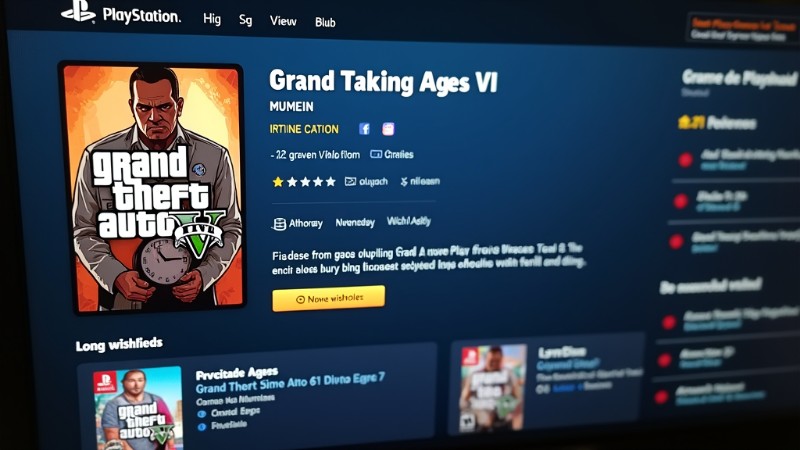A new listing on the PlayStation Store has caught the attention of gamers, sparking both amusement and debate. The parody game Grand Taking Ages VI humorously critiques the prolonged development cycle of Rockstar Games’ highly anticipated title, Grand Theft Auto 6. With satirical artwork and faux reviewer opinions, the game highlights the growing frustration among fans eager for updates on GTA 6’s progress.
The rise of parody games on PlayStation Store
The emergence of games like Grand Taking Ages VI sheds light on a larger issue plaguing the PlayStation Store—low-effort, satirical, or parody games making their way onto the platform.
Critics argue that the store’s curation policies allow these titles to clutter the marketplace, making it harder for players to discover fresh, high-quality content. Over the years, such instances have increased, prompting questions about Sony’s oversight.
Despite concerns, parody games have carved out a niche in the gaming landscape. By blending humor with cultural critique, these games offer players a chance to engage with gaming culture in an entirely new way. Grand Taking Ages VI, for instance, not only mocks Rockstar’s famously slow development cycles but also provides a comedic lens through which fans can process their anticipation and impatience.
Satire and fan engagement
The success of Grand Taking Ages VI highlights how satire can act as a double-edged sword in the gaming world. On one hand, it provides fans with a creative outlet to vent their frustration over lengthy wait times for games like GTA 6. On the other, it underscores the disconnect between fans’ expectations and developers’ timelines.
Rockstar Games has traditionally maintained a tight-lipped approach to its projects, offering few updates about GTA 6 despite fan clamors. This has left many wondering whether parody games like this reflect genuine frustration or serve as a clever marketing tool to keep the conversation alive. Some speculate Rockstar may even have orchestrated the parody to generate buzz, though no evidence supports this theory.
Regardless of its origins, the parody game is a testament to the power of fan enthusiasm. The anticipation for GTA 6 has reached such a fever pitch that even a satirical jab can stir widespread discussion within the gaming community.
Transparency in game development
The prolonged wait for GTA 6 highlights a recurring challenge in the gaming industry—managing fan expectations. While lengthy development cycles are often necessary to deliver quality games, they can leave fans feeling disconnected and undervalued.
Developers like Rockstar face mounting pressure to strike a balance between maintaining secrecy and fostering meaningful communication with their audience.
With Grand Taking Ages VI amplify the call for greater transparency in the industry. By poking fun at the lack of updates, these games serve as a reminder of the importance of engaging directly with fans. For Rockstar, this could mean more regular updates, teasers, or even a roadmap to reassure the community that progress is being made.
These lighthearted critiques remind creators that fans are not just consumers but invested stakeholders in the gaming experience. The conversation sparked by Grand Taking Ages VI underscores the need for developers to listen, adapt, and respond to the voices of their most loyal supporters.
Gaming culture in parody games
The appearance of Grand Taking Ages VI on the PlayStation Store has sparked debate about the role of satire in gaming and the expectations placed on developers. Whether seen as a harmless joke or a calculated marketing move, the parody game highlights key issues within the gaming industry, from extended development timelines to communication gaps between creators and fans.
As gamers eagerly await Rockstar’s next masterpiece, the parody game serves as both a critique and a celebration of the gaming community’s passion. It’s a reminder that humor, even in the form of satire, has the power to bridge gaps and keep conversations alive. Moving forward, fostering transparency and communication will be essential for developers to maintain trust and cultivate lasting relationships with their audiences.







